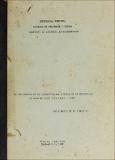| dc.contributor.advisor | Salazar, María Elena | |
| dc.contributor.author | De la O Murillo, Julia María | |
| dc.date.accessioned | 2020-08-04T23:32:35Z | |
| dc.date.available | 2020-08-04T23:32:35Z | |
| dc.date.issued | 1982 | |
| dc.identifier.uri | http://hdl.handle.net/11056/17818 | |
| dc.description.abstract | El ámbito general de esta tesis está concebido para abarcar el contexto latinoamericano, en el sentido de que se examinarán brevemente las características que ha revestido la creciente intervención estatal en el desarrollo latinoamericano con el objeto de ubicar en ese marco general el caso de Costa Rica. De esta manera, el caso particular de Costa Rica se presenta como un paradigma contra el cual podrán contrastarse los otros casos de países latinoamericanos conforme la investigación futura avance en ese sentido. La tesis que planteamos se enmarca en el contexto de la investigación del programa de estudios del Instituto de Estudios Latinoamericanos, por cuanto el tema por tratar trasciende los límites de nuestro país para tocar una problemática que es inherente a la evolución histórica de toda religión. En efecto, si bien presentamos el caso costarricense para corroborar la hipótesis general de la investigación, el tema del crecimiento de la Administración Pública en el desarrollo lo tratamos desde la perspectiva latinoamericana. Expondremos en primer término el marco teórico en que se basará esta tesis. Trataremos ahí del papel general de la Administración Pública en el desarrollo y del enfoque teórico de la burocratización como fenómeno inherente al avance de las sociedades hacia etapas superiores de su evolución histórico-económica. Pasaremos luego a exponer nuestras hipótesis general sobre el crecimiento de la Administración Pública como producto de los mayores esfuerzos por superar estadios de subdesarrollo. Se pasa después a la puntualización de la metodología por seguir en el proceso de investigación de esta tesis, para entrar en los capítulos V y VI al desarrollo propiamente del tema de investigación, tratando primero de ubicar el tema en el contexto latinoamericano y avanzar inmediatamente hacia el análisis de las características, consecuencias y relaciones entre variables del crecimiento de la Administración Pública costarricense y su influencia en el desarrollo socioeconómico, con particular énfasis en el período 1950-1980. Por último, se agrega un capítulo de conclusiones a las que nos ha conducido la investigación. | es_ES |
| dc.description.abstract | The general scope of this thesis is designed to cover the Latin American context, in the sense that the characteristics that the increasing state intervention in Latin American development has covered will be briefly examined in order to locate the case of Costa Rica in this general framework. In this way, the particular case of Costa Rica is presented as a paradigm against which the other cases of Latin American countries can be contrasted as future research advances in this regard. The thesis that we propose is framed in the context of the research of the study program of the Institute of Latin American Studies, since the subject to be treated transcends the limits of our country to touch on a problem that is inherent to the historical evolution of all religion. In effect, although we present the Costa Rican case to corroborate the general hypothesis of the investigation, we deal with the issue of the growth of Public Administration in development from the Latin American perspective. We will first expose the theoretical framework on which this thesis will be based. We will deal there with the general role of Public Administration in development and with the theoretical approach of bureaucratization as a phenomenon inherent in the advancement of societies towards higher stages of their historical-economic evolution. We will then go on to present our general hypotheses about the growth of Public Administration as a result of the greater efforts to overcome stages of underdevelopment. It then goes on to point out the methodology to be followed in the research process of this thesis, to enter chapters V and VI to develop the research topic itself, first trying to locate the topic in the Latin American context and move immediately towards the analysis of the characteristics, consequences and relationships between variables of the growth of the Costa Rican Public Administration and its influence on socioeconomic development, with particular emphasis on the period 1950-1980. Finally, a chapter of conclusions is added to which the investigation has led us. | es_ES |
| dc.description.sponsorship | Universidad Nacional, Costa Rica | es_ES |
| dc.language.iso | spa | es_ES |
| dc.publisher | Universidad Nacional, Costa Rica | es_ES |
| dc.rights | Acceso abierto | es_ES |
| dc.rights | Attribution-NonCommercial-NoDerivatives 4.0 Internacional | * |
| dc.rights.uri | http://creativecommons.org/licenses/by-nc-nd/4.0/ | * |
| dc.subject | COSTA RICA | es_ES |
| dc.subject | ADMINISTRACIÓN PÚBLICA | es_ES |
| dc.subject | BUROCRACIA | es_ES |
| dc.subject | PUBLIC ADMINISTRATION | es_ES |
| dc.subject | BUREAUCRACY | es_ES |
| dc.title | El crecimiento de la administración pública en el desarrollo: el caso de Costa Rica (1950-1980) | es_ES |
| dc.type | http://purl.org/coar/resource_type/c_7a1f | es_ES |
| una.tesis.numero | 0913 | es_ES |
| dc.description.procedence | Instituto de Estudios Latinoamericanos (IDELA) | es_ES |


